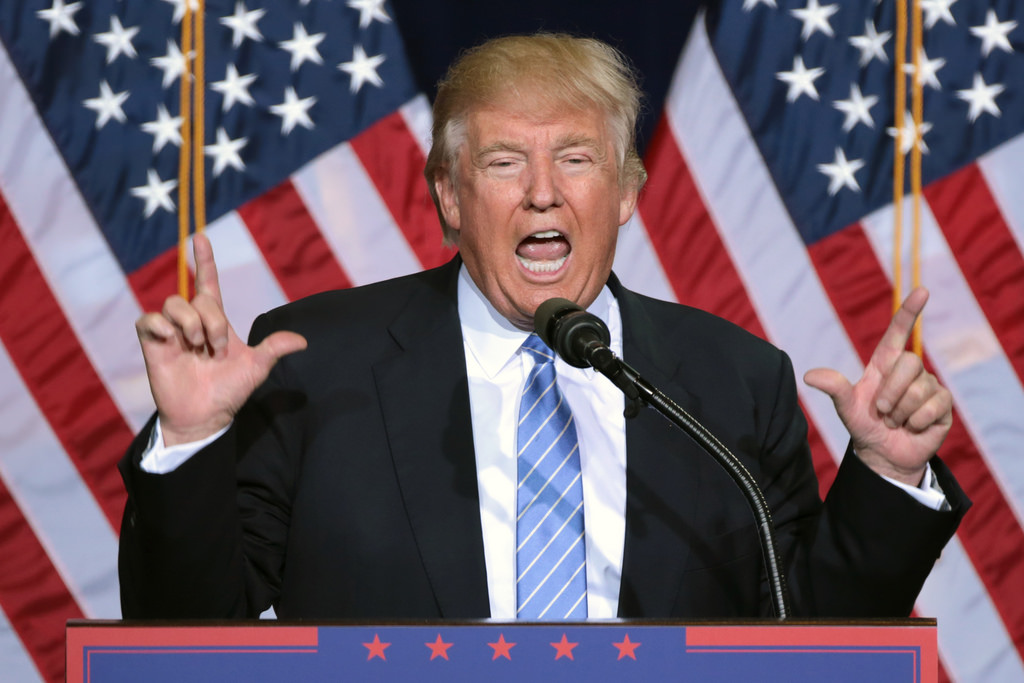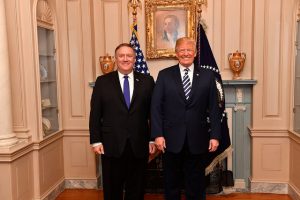By Paul R. Pillar
Confusion has prevailed regarding the purposes of the U.S. troop presence in Syria, and whether the declared purposes are the actual ones. Originally the expedition was widely understood to be all about combating the Islamic State (ISIS) after the group had established a mini-state on a large portion of Syrian and Iraqi territory. Then hawks within the Trump administration and President Trump himself, in a classic case of mission creep, declared that the U.S. troops were also in Syria to “watch Iran.” Later variations of the creeped-up mission included not only watching Iran but also, through some unexplained mechanism, getting Iran and maybe Russia to abandon their positions in Syria.
More recently, Trump has been under much pressure from various parts of the political spectrum to keep the U.S. military in Syria, in contradiction with his earlier stated intention to exit and his orders to redeploy troops that had been in the Kurdish-inhabited northeastern part of the country. Political pressures and contradictory tendencies are a prescription for even less clarity than before about what the troops’ mission is or ought to be. Trump, who is trying to milk as much political advantage as possible from the killing of ISIS leader Abu Bakr al-Baghdadi and proclaimed that because of al-Baghdadi’s death “the world is now a much safer place,” is resisting the idea that the original mission of combating ISIS in Syria is still necessary, at least in the general and open-ended way in which that mission was first framed. So now the declared mission has evolved yet again, with a new rationale that had emerged even before al-Baghdadi’s removal. Some U.S. troops are staying in eastern Syria, according to this rationale, to secure Syria’s modest oil resources.
There is still an ISIS dimension to this rationale, in that the group, while it had its mini-state, gained some revenue from exploitation of oil fields under its control. But to do that it needed the mini-state. Any scenario in which ISIS once again exploits, rather than just damages, Syrian oil fields presupposes re-establishment of its territorial caliphate, which means the world would once again be facing a bigger and more general anti-ISIS task. In its current status as an insurgent movement and terrorist group rather than a mini-state, ISIS is in no position to exploit the oil, except perhaps in an extremely small way, in the manner of Nigerian banditry, by surreptitiously tapping into a pipeline.
This leaves open the question of what the Trump administration intends to do with the oil that it has “secured” through military occupation. That in turn raises disturbing questions of whether the United States is engaging, contrary to international law, in wartime pillaging of Syria’s oil.
But there is another disturbing implication that deserves attention especially because of how big a deal Trump is attempting to make of the blows against ISIS and how they supposedly have made the world “much safer.” From a counterterrorist perspective, taking possession of oil resources is one of the worst possible rationales for justifying a U.S. military presence in a foreign country. And in his Sunday morning performance, Trump couched the subject in one of the worst possible ways.
A prominent and longstanding theme in the ideology and propaganda of terrorist groups rooted in the Arab Muslim world—including al-Qaeda and ISIS—is that the United States and the West are out to plunder the resources of Muslims. Such groups violently oppose U.S. troops in Muslim countries partly because they are seen as furthering the plundering mission. Osama bin Laden repeatedly returned to this theme. In a 2004 audio recording, for example, bin Laden stated that “the biggest reason for our enemies’ control over our lands is to steal our oil.” Bin Laden’s successor, Ayman al-Zawahiri, in a 2005 video called on his followers to “focus their attacks on the stolen oil of the Muslims…This is the greatest theft in the history of humanity. The enemies of Islam are consuming this vital resource with unparalleled greed.” The terrorists’ focus on oil has raised concerns about terrorist attacks on oil facilities, but the idea of stealing resources that rightfully belong to Muslims has motivated attacks on the United States wherever such attacks can be staged.
Trump’s Sunday appearance before the press played right into this theme. Referring back to the Iraq War, Trump described as his own view at the time that if the United States was going into Iraq, it should “keep the oil.” As for Syria’s oil, he said it can help the Kurds but “it can help us because we should be able to take some also. And what I intend to do, perhaps, is make a deal with an Exxon Mobil or one of our great companies to go in there and do it properly.” A propagandist for ISIS or al-Qaeda would hardly have written the script differently.
Even if there were any ISIS fighters who turn away from their cause in response to Trump’s probably embellished account of a “screaming, crying, whimpering” al-Baghdadi, there surely are many more who are energized by the evidence confirming what their leaders have always told them about U.S. plundering of Muslim resources. Trump’s priority, however, was not in speaking to them but instead, as always, to his domestic political base.






How can you talk about American presence in the Middle East without mentioning our foreign policy for the region? Who directs it, what is the ultimate goal and what does it entail in American military resources and potential threats to those forces? We don’t make a move in that part of the world without the approval of AIPAC/Israel. That is our policy. To allow a client state of 8 million people tell us how to behave amongst hundreds of millions of mostly Arab but also Central Asian Muslims is not only stupid, it is against our military and economic interests. We can support Israel without alienating these hundreds of millions of innocent people who just want to be left alone. We don’t because we answer to Jerusalem which is possible because of American domestic politics which have been dominated by agents of these 8 million jews who live in Israel. Again, I support Israel but I do not place their desires above the other people that live in that part of the world. And I don’t place their interests above American interests, which are different from Israel’s. We have world wide responsibilities which don’t always allow us to ignore the billions of people we share the planet with. Israel needs to get that message and Americans have to give up their anti-Arab views which have been created and nurtured by our allegedly “free” press. We just have to return to our roots which was to avoid foreign entanglements and their wars. We can support Israel without going to war with the Arab world. We just have to have the courage to say no to our special interests. Building a policy that blindly supports 8 million and dehumanizes hundreds of millions is not only stupid it should be criminal. It puts millions of Americans at risk for the benefit of others who are not Americans, just our friends. We should put our interests ahead of our friends. As they say, it isn’t rocket science.
China, is the elephant in the room, as they have made huge contracts with the Kurds, to develop their oil, now that they have been told to abandon Ayatollah deals, if they don’t want to get seriously sanctioned by US. It appears that US wants to not give all the oil. But the Chinese want to develop their Silk Road initiative and challenge US government in the area. So the real problem is China’s energy needs not US. And of course for China read US and EU multinationals in China. So it is all a little more subtle than it is depicted here.
U.S. Congressional leadership should censure Trump for his comments about protecting or taking the oil. That is not U.S. policy.
Under Obama U.S. military action in Syria was dedicated to the defeat of ISIS. The U.S. military continued this program after the election of Trump. Rules of engagement for U.S. forces were to avoid attacks on Syrian military. There was at least one accidental hit on Syrian military units in an area vacated by ISIS shortly before.
John Bolton wanted to build up U.S. military in Syria to counter Iran. Mattis opposed that. Trump when he made to first call to withdraw U.S. forces made the statement “I don’t care what Iran does in Syria.”
Trump is so confused that he is becoming major liability to the U.S.
I must admit that this latest of Trump’s ejaculations has really helped the Axis of Resistance.
Paul Pillar rightly condemns Trump’s talk about taking Syrian oil. Vidbeldavs comments “Trump is so confused that he is becoming major liability to the U.S.” But isn’t it clear that faking a new objective of “keep ISIS from getting money to support terrorism from Syrian oil” was just the best the ‘stay-in-Syria’ cabal could come up with to reverse Trump’s evacuation decision?
More interesting was VP Pence’s explanation on the KPBS Newshour last night about US military in Syria: Trump only ordered that policing of the Syria-Turkey border should stop; US troops will remain elsewhere in Syria to complete the initial and continuing objective of completely defeating ISIS; and don’t worry because US Special Forces are located where they need to be and he could not say anything about how many and where those Special Forces are in Syria. So much for Trump’s bragging about ‘bringing the boys home’ from Syria.